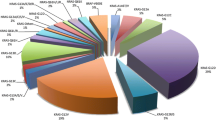Abstract
PURPOSE. Multiple attempts have been made to improve the clinical/pathologic staging system of Dukes to focus adjuvant therapy decisions. The purpose of this study was to determine whetherK-ras mutational status of regional nodes in patients with Dukes B2 colorectal cancer could be used to stage their disease more accurately. METHODS: Using formalin-fixed, paraffin-embedded archival material, tumor samples were screened forK-ras mutations using a mutation-specific polymerase chain reaction method, followed by gel electrophoresis in a 96-well array. Patients with Dukes B2 tumors that have mutations in codon 12 or 13 of theK-ras gene were identified. RESULTS: Mutational analysis of the lymph nodes from these patients revealed an 80 percent (16/20) incidence of the same mutations in regional lymph nodes. None of the four patients with mutation-free nodes developed recurrence compared with 37.5 percent (6/16) withK-ras positive lymph nodes. CONCLUSIONS: The data suggest that patients with Dukes B2 colorectal cancers that have mutations in codon 12 or 13 of theK-ras gene are at high risk for the development of nodal metastases. Mutational analysis of the lymph nodes identifies high-risk patients who should be considered for adjuvant chemotherapy. Therefore,K-ras mutational analysis should be considered for molecular staging of colorectal cancer.
Similar content being viewed by others
References
American Joint Committee on Cancer. Manual for staging of cancer. Philadelphia: JB Lippincott, 1987.
Cohen AM, Tremiterra S, Candela F, Thaler HT, Sigurdson ER. Prognosis of node-positive colon cancer. Cancer 1991;67:1859–61.
Muto T, Bussey HJ, Morson BC. The evolution of cancer of the colon and rectum. Cancer 1975;36:2251–70.
Nishisho I, Nakamura Y, Miyoshi Y,et al. Mutations of chromosome 5q21 genes in FAP and colorectal cancer patients. Science 1991;253:665–9.
Vogelstein B, Fearon ER, Hamilton SR,et al. The genetic alterations during colorectal-tumor development. N Engl J Med 1988;319:525–32.
Bos JL.ras oncogenes in human cancer: a review. Cancer Res 1989;49:4682–9.
Boughdady IS, Kinsella AR, Haboubi NY, Schofield. K-ras gene mutations in adenomas and carcinomas of the colon. Surg Oncol 1992;1:275–82.
Finkelstein SD, Sayegh R, Bakker A, Swalski P. Determination of tumor aggressiveness in colorectal carcinoma by K-ras 2 analysis. Arch Surg 1993;128:526–32.
Astler VB, Coller FA. The prognostic significance of direct extension of carcinoma of the colon and rectum. Ann Surg 1954;139:846–51.
Stork P, Loda M, Bosar S, Wiley B, Poppenhusen, Wolfe H. Detection of K-ras mutations in pancreatic and hepatic neoplasms by non-isotopic mismatched polymerase chain reaction. Oncogene 1991;6:857–62.
Greenson JK, Isenhart CE, Rice R, Mojzisik C, Houchens D, Martin EW. Identification of occult micrometastases in pericolic lymph nodes of Dukes' B colorectal cancer patients using monoclonal antibodies against cytokeratin and CC49. Cancer 1994;73:563–9.
Cutait R, Alves V, Lopes LC,et al. Restaging of colorectal cancer based on the identification of lymph node micrometastases through immunoperoxidase staining of CEA and cytokeratins. Dis Colon Rectum 1991;34:917–20.
Losi L, Benhattar J, Costa J. Stability of K-ras mutations throughout the natural history of human colorectal cancer. Eur J Cancer 1992;28A:1115–20.
Dix BR, Robbins PD, Spagnolo DV, Padovan GL, House AK, Iacopetta BJ. Clonal analysis of colorectal tumors using K-ras and p53 gene mutations as markers. Diagn Mol Pathol 1995;4:261–5.
Shibata D, Schaeffer J, Li ZH, Capella G, Perucho M. Genetic heterogeneity of the c-K-ras locus in colorectal adenomas but not in adenocarcinomas. J Natl Cancer Inst 1993;85:1058–63.
Burmer GC, Loeb LA. Mutations in the Kras2 oncogene during progressive stages of human colon carcinoma. Proc Natl Acad Sci U S A 1989;86:3403–7.
Ohmura M, Hattori T. A possible multiclonal development in human colonic carcinomas. J Cancer Res Clin Oncol 1995;121:321–6.
Author information
Authors and Affiliations
Additional information
This work was done at the Ferguson-Blodgett Digestive Disease Institute, Grand Rapids, Michigan.
Financial support came from the Ferguson-Blodgett Foundation.
Read at the meeting of The American Society of Colon and Rectal Surgeons, Philadelphia, Pennsylvania, June 22 to 26, 1997.
About this article
Cite this article
Thebo, J.S., Senagore, A.J., Reinhold, D.S. et al. Molecular staging of colorectal cancer. Dis Colon Rectum 43, 155–159 (2000). https://doi.org/10.1007/BF02236973
Issue Date:
DOI: https://doi.org/10.1007/BF02236973




